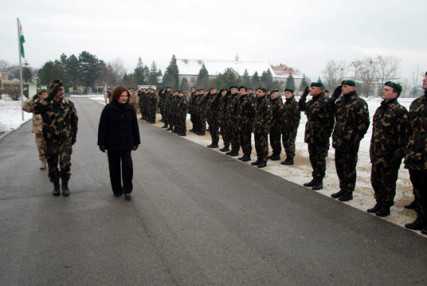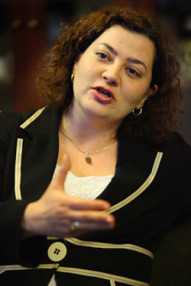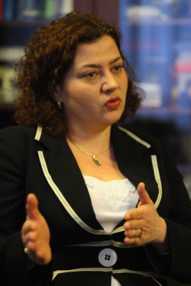“We Still Have A Lot To Do In The Balkans”
Szöveg: Ádám Draveczki-Ury | 2010. január 20. 7:37In the opinion of Ágnes Vadai, the State Secretary of the Ministry of Defence 2009 was a successful year despite the difficult economic-financial circumstances. In her interview with honvedelem.hu the state secretary told in detail about the duties at home and the current issues related to Hungarian missions abroad.
For you the previous year ended with a visit to the Balkans, you have been to Kosovo and also to the Hungarian troops serving in Bosnia. How would you sum up the most important experiences?
The visit had a single pleasant aim: to take our troops, who spent the holidays far away from their home, some Christmas presents. I have been monitoring the activities of the present contingent in Sarajevo from the start, for I have already been to their camp. Now we could clearly see the progress, how the team has become one. Of course, they are from the same corps, but a foreign mission, the fact that you are more dependent on each other brings the team together even more, as we could see. The troops serving in Kosovo were also working enthusiastically in the unbelievably heavy snowfall. And I also happen to like this region – not only the landscape, the countries, but the negotiating partners as well, and I have a very high opinion of the work done by our soldiers here. Unfortunately, we hear a bit less about the Balkans today, even though the stability of the region is of key importance as regards the security of Hungary.
Especially now, when military operations in Kosovo and Bosnia are facing some major transformation… Didn’t you feel any uncertainty there because we do not know yet what kind of modifications can be expected?
It is obvious that everybody is concerned about the future of the missions, which is the question of political decisions, of course. I say let’s see what happens in the end, because the situation is not as stable as it may seem at first sight, neither in Bosnia and Herzegovina, nor in Kosovo. Although it is true that the parties have not been shooting at each other for quite a while, but this does not mean that everything is all right under the surface as well… Apparently there are some extremist actions in Bosnia, which may make the international community seriously concerned, and in the case of Kosovo let us not forget that we are talking about a very new state, where everything is under construction at the moment, and they need considerable help with that. I think the Hungarian Defence Forces as well as the Republic of Hungary still have a lot to do here.

Some of our allies seem to disagree to some extent.
What we have been emphasizing from the beginning is that we will stay in the region until there is a need for that. In addition to that – and it is especially important in the case of Bosnia, where there have been unilateral troop withdrawals – we think the ’in together, out together’ principle should be followed. Every mission has to end once, it is absolutely clear, but ’when’ is not an insignificant question either. And it would be very unfortunate to ruin the successes of the past years with bad political decisions. Politicians have to listen to the opinion of soldiers, commanders serving in the concerned area, including the Hungarian troops, because they have firsthand experience and know what is in the air in both Kosovo and Bosnia.
Are there any positive moves in this issue on behalf of the allies calling for layoffs or the withdrawal of troops from Bosnia?
The case of Bosnia has been dragging on for long. There was even a release that was leaked, wrongly, and circulated in connection with the Deauville informal summit, saying that the European Union would terminate the ALTHEA mission. As I told the press back then, it was out of the question. Certainly there are some countries that would like to redeploy their forces to other EU activities, and it is also understandable that allies with a strong fleet would rather focus their commitments on the Somalian coastline. But one has to realize that for Hungary, the security of the Balkans is of fundamental importance. And the European Union is about solidarity too, therefore it can be expected from western member states to properly deal with the eastern half of our continent as well, similarly to the African missions. Mainly because the primary security challenges facing the European Union originate from here… The interests of one or two member states cannot overwrite the security interests of the whole community. We still have a lot to do in the Balkans.
Do you agree with the statement of Stipe Mesic, saying that in case the tensions in the region are not treated properly, Bosnia may even become the Palestine of Europe, or is this an exaggeration?
Powerful, extremist actions do not do any good to anyone, but it is sure that a military operation does not end with the completion of the actual military tasks. People who were living under war circumstances for years have to be helped to create the conditions of normal everyday life. Acts of genocide were committed in the Balkans in the ’90s, and there is not a family that has not been affected by these events in one way or the other, and has not lost anyone in the conflicts. These things cannot be forgotten in an instant, and it is very easy to politically manipulate the simple and obvious feelings of the people.
In 2010 we will increase the number of our troops serving in Afghanistan, but with regard to the specified number of troops on mission some regrouping will be necessary in order to accomplish this. Can I conclude from what you have said that we will not increase the Afghanistan contingent at the expense of the missions in the Balkans?

In that case, do we already know where we would regroup the soldiers from?
I am aware that it is important to publish the information as fast as possible, but I think strategically it is the best if everything is made public when all the points are elaborate and clear.
Before the Balkans, you went to Algeria. What are the results of this visit?
As the result of the negotiations, the agreement between Zrínyi Miklós University of National Defence and the Algerian defence ministry, which makes it possible for the officers of the African country to come to Hungary to study, can be signed soon, hopefully. But in addition to education, we also discussed some other types of cooperation: in the field of military technology, cooperation can be formed with several subordinate companies of the Ministry of Defence. Our negotiating partners were also very interested in Hungarian military health care, and not only the NATO Center of Excellence but the MoD National Health Care Center (HM Állami Egészségügyi Közpoont, ÁEK) as well, which is one of the most modern hospitals in Europe. I can see the possibility of cooperation in other areas too, but a part of them are already beyond the authority of the MoD: for example it was the President of Algeria himself who brought up the possibility of a cooperation in energetics. And we do know about a few Hungarian companies who are making attempts out there.
Did the Central Asian visit, with stops in several countries, have a similar purpose, namely the establishment of relations?
We had minimal relations with the concerned countries, but the nature of our relations with them does count, even because of Afghanistan for instance, since all units use their airspace on their way to Afghanistan. In addition to that, it would be worth cooperating with them in many other areas as well, for example in military technology. We hope that the Kazakh delegation will arrive to Hungary soon, to give the cooperation an official form. It cannot be ignored either that at the moment Kazakhstan chairs the OSCE. What I have experienced is that where military diplomatic relations are forming, they bring the rest with themselves sooner or later.
Back to home affairs: you say about 2009 in every forum that it was a difficult year, but what else was it like beyond that?
The easiest thing to do is to emphasize the difficulties because of the economic crisis, but we should not forget that after 2008, the defence forces were stable in 2009 too: for the first time since the change of the system, nothing was closed down and nobody was sent away in these two years. I think it is very important, for we have managed to retain the workplaces of civil employees and troops as well. Naturally, we could not avoid the abovementioned difficulties either, but despite the economic–financial circumstances, I still consider 2009 a successful year. For example we have managed to solve the question of working during retirement, against every other effort made in various directions. The epaulet of retired personnel, the question of entitlement to medical care in the ÁEK, the modification of the Act on the legal status of professional troops (Hjt.), the protection of the uniform – what is more, the latter is a joint success, for it could be tabled as a priority issue as the result of the support of five parties. I hope 2010, together with its difficulties, will be an even more successful year for the Hungarian Defence Forces, and we can advance in several issues in which there has been less progress lately. As regards the Ministry of Defence, the death of General Géza Stefán was perhaps the saddest moment of the previous year, because with the general we have lost a leader who was an important person in the life of the Republic of Hungary since the change of the system.
Which are those specific fields where there is a need for advancement?
It is time for certain developments in military technology, but more understanding is necessary in this issue, even from politicians. The demagogic approach, which says we should decide between a school or one more combat vehicle, sounds very good, but only those people say such things who have never spoken with the troops. Soldiers do their duty in the interests of Hungarian citizens, even if ordinary people meet them at home only if there is a flood or a snowfall. True, the legends say that if something is broken, the Hungarian soldier can fix the equipment even with a leaf of grass, but we need land developments just like we need new helicopters for example. In addition to that, the improvement of the circumstances of life and employment is still a priority issue, and we would like to have barracks where the personnel working there can feel that they really own the place. The same applies to troops living in various military hostels, naturally. After the change of the system we had plenty of properties which were considered state properties by everyone back then – now that they are full of weed the approach has changed to "Oh, that piece of land belongs to the defence forces, they should do with it whatever they want!". But we are talking about common things, and a part of the selling price has to be spent on the next phase of the barracks reconstruction program by all means.
One of the especially important events in the previous year was that after a long preparation process, the framework for the further development of the voluntary reservist system has been created.
Although with the modification of the Hjt. the defence portfolio has created the proper framework, but I would like to remind everyone that people cannot be forced to do anything with legal provisions alone. The voluntary reservist system has existed before, but no applicants turned up. We have to accept that the interpretation of patriotism today is totally different from what it was 20, 30, or even 40 years ago. Not better, not worse, different. There is no point in having laws if they are not accompanied by proper financial motivation, for in the middle of the economic crisis nobody will join the reservist corps only for ’our beauty’, and perhaps even risk his or her job with this. In other words, both the employer and the employee have to be motivated, even though this is a question which is beyond the responsibilities and scope of authority of the defence portfolio. And it is still not certain that masses of people would sign up for the voluntary reservist corps… The conditions have been created, in this respect we have accomplished the task, but nobody should be disappointed when they see that there are not tens of thousands of applicants pouring in. It is possible that former contracted troops could be more motivated in this field, but their labour law protection and proper financial motivation have to be guaranteed.
Does the MoD have specific suggestions for the Ministry for Economy and the Ministry of Labour in this issue, or is the ball in their court from now on?
Naturally, we have had suggestions before and we still have some. We must figure out how an employer can be convinced to allow the employee in question to take six weeks off for instance: with social security benefits, or perhaps various aids. I think tax allowances are less likely, for the Hungarian tax system is heading another direction. The employee also has to be convinced not to take his or her paid holidays during the period in question, but crawl and creep, prepare themselves for service – not for free, of course, since nobody can exist without income for several weeks. We are leading in the creation of rules, but they have to be incorporated in a legal environment that has existed for long. I do not think all this should be paid from the budget of the defence portfolio – rather from the central reserves or other sources.
How can you make the people understand the purpose of the reservist system? It seems that the majority think that we are talking about a formation that is similar to the National Guard in the US.

In recent months you have visited every association of retired military personnel in the country. Will this program continue this year?
By September I have visited every association, so this circle has been done fully, so to say, but I am still in contact with the clubs of retired servicemen, even because I also represent the Minister in the Council on Elder Affairs. There are clubs I have been invited to and I will go to again, for example I will be there at the Ball of Retired Budapest Servicemen. They invite me every year and I always consider it an honour to be there. I will also go to the Club of Retired Servicemen in Vác again early this year. In the course of the meetings we were collecting the problems of retired personnel and we have managed to solve many of them. Of course, there still are some issues that have to be resolved, such as the question of a home for retired servicemen. The veteran clubs can also have an important role in recruitment, because experience shows that if in the family the grandfather was a soldier, then at least one grandchild will also choose this career.